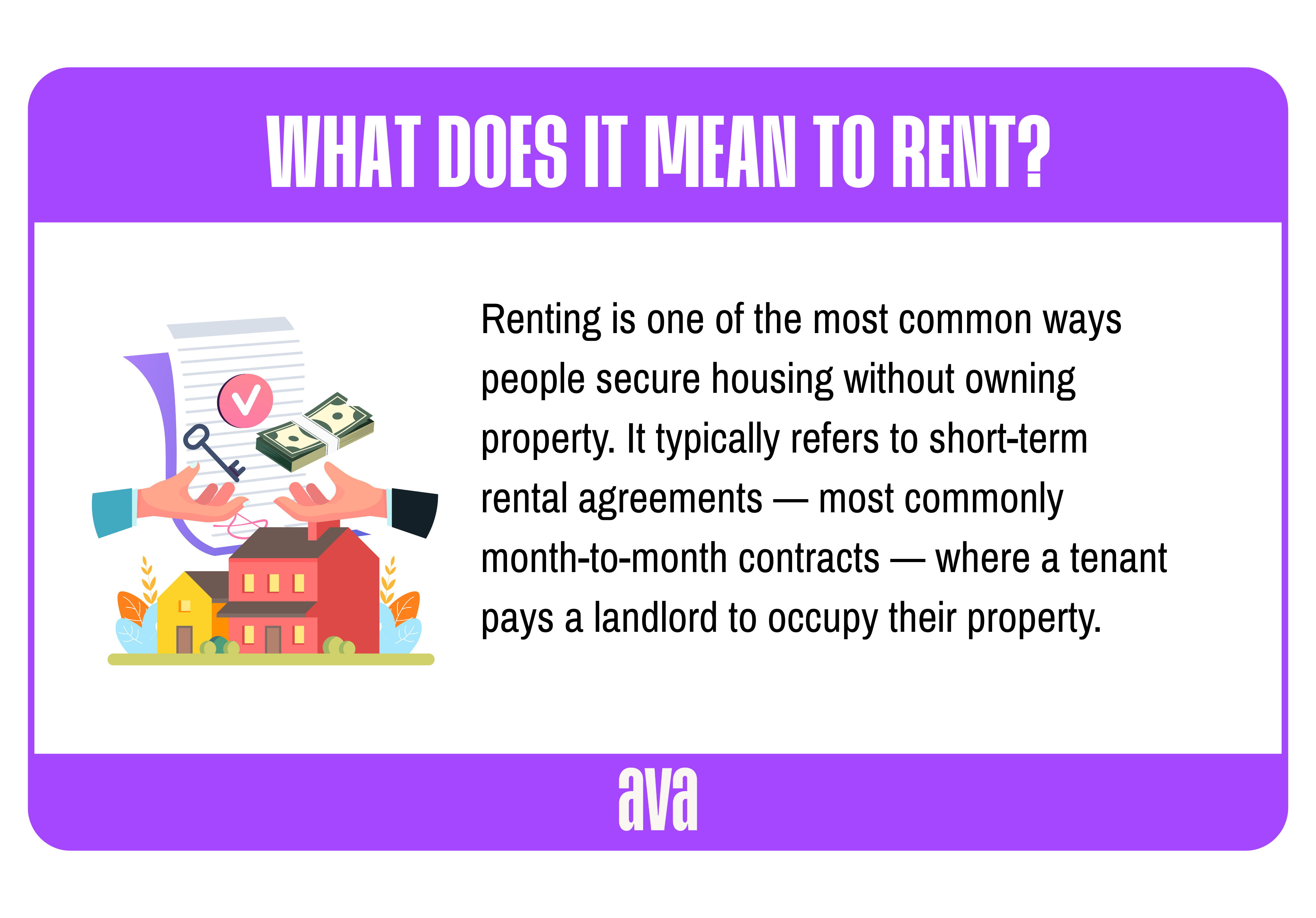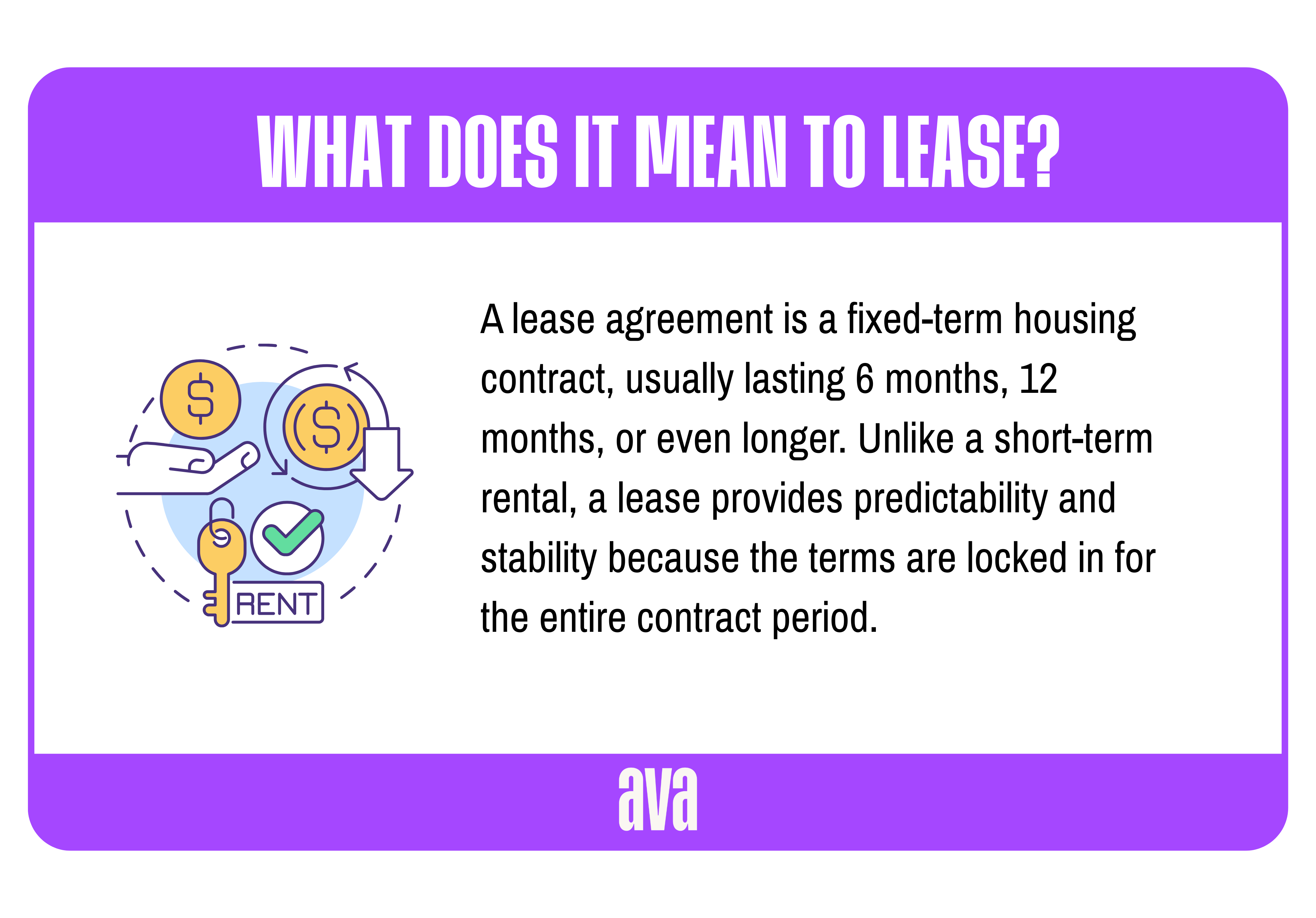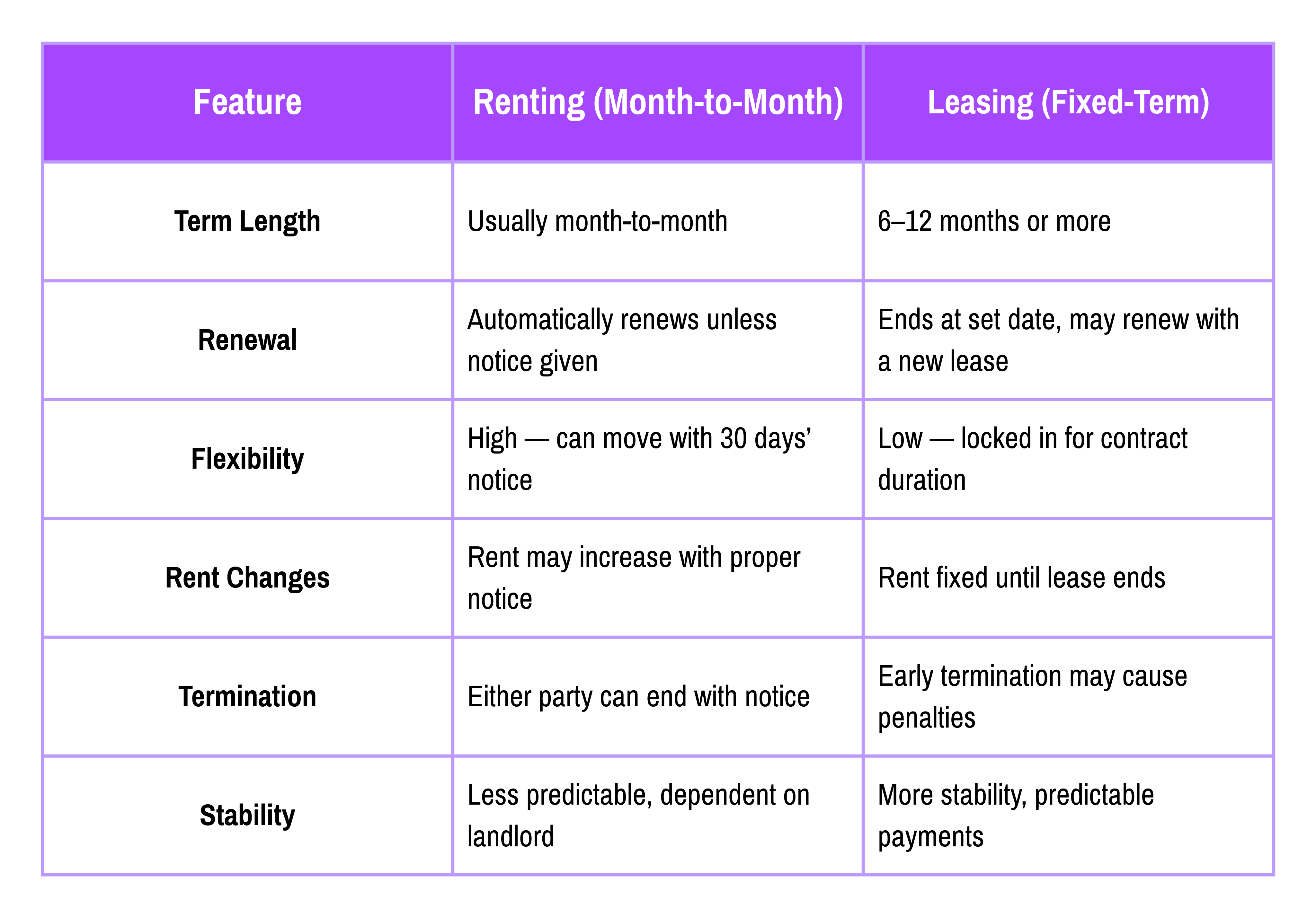Moving into a new place isn’t just about packing boxes and picking furniture. One of the biggest decisions you’ll make upfront is whether to rent month-to-month or sign a longer-term lease. At first glance, both seem similar — you pay a landlord to live in a space you don’t own. But beneath the surface, the contract type you choose can affect your housing stability, monthly costs, and even your credit report.
If you’re trying to balance flexibility vs. stability, and especially if you’re focused on building your credit, understanding the differences between renting and leasing is crucial. This guide breaks everything down step by step so you can make the choice that fits your financial and lifestyle goals.
What Does It Mean to Rent?

Renting is one of the most common ways people secure housing without owning property. It typically refers to short-term rental agreements — most commonly month-to-month contracts — where a tenant pays a landlord to occupy their property. Unlike a lease, which locks you into a set period (like 12 months), renting on a short-term basis offers more flexibility but often less stability.
Rental agreements can be written or verbal, though a written contract is always safer because it clearly spells out the responsibilities of both landlord and tenant. A standard rental agreement usually includes:
- The monthly rent amount and due date.
- The security deposit amount, conditions for deductions, and refund rules.
- Whether utilities (electricity, water, gas, internet, trash pickup) are included or separate.
- Rules and restrictions, such as pet allowances, smoking policies, overnight guest rules, or subletting policies.
Flexibility of Renting
One of the biggest advantages of renting is flexibility. Unlike a lease, which ties you to a property for months or years, most rental agreements automatically renew each month. Either party can typically end the agreement by giving written notice — usually 30 days in advance.
Example: Imagine you’ve taken a temporary six-month assignment in a new city. You’re unsure if you’ll stay beyond the project. By renting month-to-month, you can move out at the end of your contract without the stress of breaking a lease or paying early termination penalties.
This makes renting especially attractive for:
- Students who may only need housing during a semester or school year.
- Young professionals testing out a new job or city.
- Families in transition — for example, between selling one home and buying another.
- Anyone planning big life changes, such as job transfers, relationship changes, or saving to purchase a home.
Why Renting Works for Some People
- Perfect for short-term needs: Students, interns, and contract workers benefit from flexible timelines.
- Ideal for “testing the waters”: New residents can try a neighborhood before committing long-term.
- Helpful during transitions: People between homes or careers can rent temporarily while planning their next move.
- Lower upfront cost than buying: Renting typically requires less money upfront compared to a mortgage down payment, though security deposits and first/last month’s rent may still add up.
The Downsides of Renting
Flexibility does come with trade-offs:
- Rent Increases: Landlords can raise rent at the end of each term (usually monthly) with proper notice. While some states have rent control laws that limit increases, in many areas, tenants risk sudden hikes.
- Housing Insecurity: Because landlords can choose not to renew, there’s always the possibility of being asked to move out on short notice. For families or people with kids in school, this uncertainty can be stressful.
- Potentially Higher Costs: Month-to-month rentals are often more expensive than leases. Landlords charge a “flexibility premium” because they assume higher risk with shorter commitments and frequent tenant turnover.
- Limited Credit Benefits: Unless your landlord reports payments to credit bureaus or you use a rent reporting service, your consistent on-time rental payments won’t automatically help your credit score. However, missed or unpaid rent can damage your credit report if sent to collections.
Key Takeaway: Renting is best if you need mobility and flexibility, but it comes with the risk of higher costs and less long-term housing security. If you’re also focused on credit building, you’ll likely want to pair renting with a tool like a credit builder app so your positive payments count toward improving your credit score.
What Does It Mean to Lease?

A lease agreement is a fixed-term housing contract, usually lasting 6 months, 12 months, or even longer. Unlike a short-term rental, a lease provides predictability and stability because the terms are locked in for the entire contract period. When you sign a lease, you agree to pay rent on time and follow the set rules, and your landlord agrees to let you occupy the property under those same conditions.
Key Features of a Lease
- Fixed Rent: The monthly rent amount is locked in and typically cannot be increased until the lease ends, protecting you from sudden rent hikes.
- Stable Rules: Conditions like pet policies, maintenance duties, parking arrangements, and utility responsibilities remain consistent for the duration.
- Tenant Protections: As long as you pay rent and follow the lease terms, your landlord cannot terminate the lease early — except in cases of serious violations (like property damage or illegal activity).
- Clear End Date: Once the lease expires, it does not automatically renew. You may sign a new lease, renegotiate updated terms, or switch to a month-to-month rental with landlord approval.
Example: If you plan to stay in a city for at least a year and want your rent to remain the same the entire time, signing a 12-month lease ensures predictability. You’ll avoid surprise non-renewals or sudden rent increases that often happen with month-to-month agreements.
Why Leasing Works for Some People
- Stability for Families: Parents with school-aged children often prefer leases because it guarantees housing security for at least one academic year, avoiding the disruption of sudden moves.
- Budget-Friendly Planning: Because your rent stays the same, leases make monthly budgeting easier. If your rent is $1,500, you know exactly what to set aside each month without worrying about fluctuations.
- Predictability for Long-Term Stays: Renters who know they’ll be in the same city for work, education, or personal reasons often prefer leases to avoid renegotiating every few months.
- Better Housing Options: Many landlords prefer tenants who commit to a lease, so signing one may give you more housing choices compared to only looking at short-term rentals.
The Drawbacks of Leasing
While leasing offers stability, it comes with limitations that may not suit everyone.
- Less Flexibility: If life changes — say, you get transferred to a new city or decide to buy a home — you can’t simply walk away. You’re legally bound until the lease ends.
- Breaking a Lease Can Be Expensive: If you leave before the lease term is over, you may face:
- Early termination penalties (flat fees or several months’ rent).
- Re-letting costs (covering the landlord’s expense to find a new tenant).
- Responsibility for remaining rent until a replacement tenant is found (depending on state law).
- If these fees remain unpaid, they may be sent to collections, which can show up on your credit report and lower your credit score.
- Less Negotiation Room: Unlike month-to-month rentals, lease terms are mostly fixed once signed. Adding a pet, a roommate, or changing utility responsibilities usually requires formal landlord approval or a lease amendment.
Credit Impact of Leasing
Leases, like rentals, don’t usually appear on your credit report unless your landlord reports payments to the credit bureaus. That means:
- On-time payments usually won’t help your credit score unless reported.
- Breaking a lease or unpaid fees can result in collections, which will negatively affect your credit history.
Example: If you break a lease and owe $2,000 in early termination fees, your landlord may turn the balance over to a collections agency. This collection account can drop your credit score by 50–100 points, making it harder to qualify for future rentals, credit cards, or loans.
Key Takeaway: Leasing is best for people who value long-term stability, predictable costs, and consistent housing arrangements. But if your life circumstances are uncertain, the risks of breaking a lease — especially the potential damage to your credit report — make it less ideal.
Renting vs. Leasing: Key Differences
Here’s a clear breakdown of how the two options stack up:

Key takeaway: Renting = short-term flexibility. Leasing = long-term stability.
Pros and Cons of Renting
Like most housing choices, renting month-to-month has its upsides and downsides. For some people, the flexibility is invaluable; for others, the lack of stability can be stressful. Here’s a closer look at what makes renting appealing and where it falls short.
Pros of Renting
- Flexibility
One of the biggest advantages of renting is freedom of movement. Unlike a lease that locks you in for 6–12 months, renting typically only requires 30 days’ notice before moving out. This makes renting ideal for people who:
- Expect frequent job transfers.
- Aren’t sure how long they’ll stay in a city.
- Want to test out a neighborhood before committing.
Example: If you land a 3-month consulting job, a month-to-month rental lets you stay only as long as needed without worrying about breaking a lease and paying penalties.
- Great for Transitions
Renting is often the best option during major life transitions. Whether you’re between jobs, moving in with a partner, saving for a down payment, or waiting for your new home to be built, month-to-month renting gives you housing without a long-term obligation.
Example: A couple who just sold their home may rent month-to-month for 4 months while closing on their new property, avoiding the risk of double mortgage payments.
- Negotiation Power
Since terms reset more frequently, renters have more opportunities to renegotiate. This can include:
- Requesting a roommate to share costs.
- Negotiating rent adjustments during slower rental seasons.
- Asking for small improvements (like appliances, painting, or parking arrangements).
With a lease, terms are locked for the entire contract. With month-to-month rentals, tenants and landlords often re-discuss terms more frequently, giving you greater bargaining power.
Cons of Renting
- Rent Increases
Because your contract renews monthly, landlords can raise rent more often — sometimes every 30–60 days — as long as they give proper notice. While some states enforce rent control laws that limit increases, in many areas, tenants face unpredictable housing costs.
Example: You may start paying $1,400/month, but after 6 months the landlord increases rent to $1,550. Over a year, this unpredictability makes budgeting harder compared to a fixed lease.
- Termination Risk
Month-to-month contracts come with less housing security. Your landlord can choose not to renew and ask you to leave — usually with 30 days’ notice. This uncertainty may be stressful, especially for families or renters who want long-term stability.
Example: A landlord decides to renovate or sell the property. Even if you’ve been a great tenant, you may be forced to move out at short notice, scrambling to find a new place.
- Higher Costs
Landlords often charge more for month-to-month rentals because of the increased risk of vacancy. This is sometimes referred to as a “flexibility premium.” Compared to tenants who sign 12-month leases, month-to-month renters may pay anywhere from $50–$300 more per month.
Example: A 1-bedroom may cost $1,500/month on a 12-month lease but $1,650/month on a month-to-month agreement. Over 12 months, that’s an extra $1,800 for the same unit.
Credit Impact of Renting
One of the most overlooked aspects of renting is how it affects your credit score and credit report. Many renters assume that paying rent on time each month naturally improves their credit history — but in reality, that’s not always the case. Unlike credit cards, auto loans, or mortgages, rent payments are not automatically reported to the credit bureaus unless your landlord or property manager uses a rent reporting service.
This creates a paradox:
- Good behavior (on-time rent payments) usually doesn’t show up on your credit report unless reported.
- Bad behavior (missed payments, unpaid balances, or damages) often does show up because landlords can send unpaid amounts to collections, which are reported by debt collectors.
Why On-Time Rent Payments Rarely Help
For most tenants, paying rent each month is their largest financial obligation, often bigger than a car loan or credit card payment. Yet unless your landlord partners with a reporting service (like Experian RentBureau, RentTrack, or Esusu), those positive payments won’t help your credit building journey.
Example: You pay $1,200/month in rent for 24 months straight. That’s $28,800 of responsible payment history — yet if it’s not reported, it has zero impact on your credit score. Meanwhile, one missed payment that ends up in collections could hurt your score for years.
The Risks of Unpaid Rent
While on-time rent doesn’t always get noticed, missed or unpaid rent almost always does. Here’s how:
- Collections: If you leave a balance (unpaid rent, late fees, or property damages), landlords often sell the debt to a collections agency. Collections appear on your credit report and can lower your score by 50–100 points or more.
- Court Judgments & Evictions: If your landlord sues for unpaid rent and wins, the judgment may appear in public records. Even if it doesn’t directly impact your credit score, it can hurt your ability to qualify for future rentals.
- Future Applications: Landlords, mortgage lenders, and even employers sometimes run background or credit checks. A history of collections or judgments tied to unpaid rent may work against you.
How Rent Can Help You Build Credit
The good news: renters today have more options to turn rent into credit-building power.
- Rent Reporting Services: Some property managers automatically report payments to Equifax, Experian, and TransUnion. If your landlord doesn’t, you can sign up for third-party services (often for a small monthly fee). These services verify your payments and add them as positive tradelines on your credit report.
- Credit Builder Apps: Apps like Ava Finance let you add additional positive payment history beyond your rent. This ensures your largest monthly expense isn’t wasted when it comes to building your credit score.
- Utility & Subscription Reporting: Some tools also let you report utility or subscription payments (phone, Netflix, internet), stacking even more positive history on your report.
Long-Term Effects on Credit
- With reporting: Regular on-time rent payments can help you establish a consistent payment history, one of the most important factors in your credit score. This may boost your score enough to qualify for loans, credit cards, or even a mortgage.
- Without reporting: Renting provides housing but no credit benefit. Over years, this can leave you with a “thin credit file,” limiting your financial options even if you’ve been financially responsible.
- With missed payments: Even one collection can stay on your report for up to seven years, dragging down your score and costing you in higher interest rates or application rejections.
Key Takeaway: Renting gives you freedom and adaptability, but unless your payments are reported, it won’t automatically build your credit history. The real risk is on the negative side — unpaid rent or damages can quickly damage your credit score. To get the most out of renting, consider:
- Enrolling in a rent reporting service.
- Pairing your rental payments with a credit builder tool like Ava Finance to ensure positive payment history is reflected.
- Automating payments to avoid late fees and protect your credit.
That way, your rent doesn’t just keep a roof over your head — it actively works to improve your financial future.
Pros and Cons of Leasing
Signing a lease agreement can feel like a big commitment, but for many renters, it’s the smartest way to secure affordable, predictable housing. Still, leases come with both advantages and disadvantages that you should weigh carefully.
Pros of Leasing
- Cost-Effective
Landlords often reward long-term commitment with lower monthly rent. Because leases reduce turnover, advertising costs, and vacancy risk, landlords can afford to offer better deals.
Example: A 1-bedroom apartment might rent for $1,700/month on a 12-month lease, but the same unit might cost $1,900/month on a month-to-month basis. Over the year, leasing could save you $2,400 or more.
- Budget Stability
With a lease, your rent is locked in for the entire term, protecting you from sudden increases. This predictability makes it easier to budget and plan long-term expenses.
Example: If your rent is $1,500/month on a 12-month lease, you know you’ll pay exactly $18,000 that year. Compare that to a rental agreement where rent might rise by $100 after six months — adding unexpected costs to your budget.
For renters living paycheck-to-paycheck, having fixed housing costs can mean the difference between stability and financial stress.
- Housing Availability
Landlords generally prefer long-term tenants because they provide consistent income. This means you’ll often find more housing options when you’re willing to sign a lease. In competitive rental markets, offering to sign a 12-month lease can also give you an edge over other applicants.
Example: If multiple people apply for the same apartment, the landlord may prioritize the applicant willing to commit to a year, since that lowers their risk of turnover.
Cons of Leasing
- Long-Term Commitment
The biggest drawback of a lease is the reduced flexibility. Life doesn’t always go as planned — you may need to move for a new job, family emergency, or personal reasons. Once you’re locked into a lease, breaking it can be expensive.
Example: If you’re halfway through a 12-month lease at $1,600/month and decide to move, you could still owe several months of rent unless the landlord finds a replacement tenant. Some states require landlords to mitigate losses, but you may still be on the hook until the unit is re-rented.
- Less Flexibility for Changes
Lease terms are largely non-negotiable once signed. If you decide you want to add a roommate, adopt a pet, or change utility responsibilities, you’ll likely need landlord approval. Sometimes this requires a formal lease amendment or may even result in rejection.
Example: Your lease says “no pets,” but six months in you want to adopt a dog. Without landlord approval and an official amendment, you could face fees, eviction, or loss of your security deposit.
- Breaking Lease Risks
If you break your lease and fail to pay the penalties, the landlord may send your balance to a collections agency. Once in collections, this debt will appear on your credit report and lower your credit score — making it harder to rent again or qualify for loans.
Example: You owe $2,000 in early termination fees and move out without paying. That unpaid balance could lower your credit score by 50–100 points, and future landlords may reject your rental applications after seeing a collection account tied to a broken lease.
Credit Impact of Leasing
- On-time payments: Like renting, leases typically don’t get reported to credit bureaus unless your landlord uses a reporting service. That means 12 months of perfect lease payments may not improve your credit score at all.
- Negative marks: However, unpaid rent, fees, or damages can end up in collections, hurting your credit history for up to 7 years.
- Best strategy: Pair your lease payments with a credit-building tool (such as a credit builder loan or app) to ensure your consistent payments are reflected on your credit report.
Key Takeaway: Leasing works best if you want long-term stability, predictable costs, and potentially lower rent. But it requires careful planning — breaking a lease can be expensive and even damage your credit. If you choose a lease, make sure you’re confident about staying for the full term, and use credit-building tools to make your payments count toward your financial future.
How Rent and Lease Agreements Affect Your Credit
Here’s the surprising part: rent and lease payments don’t usually appear on your credit report by default. Unless your landlord or property manager uses a rent reporting service, your on-time payments won’t automatically help your credit score.
However, missed or unpaid rent does matter:
- If your landlord sends unpaid balances to collections, it will appear as a negative mark on your credit report.
- Collections can lower your credit score significantly, making it harder to qualify for loans, credit cards, or even future housing.
Example: Paying rent on time for 2 years might not boost your credit score unless reported — but missing just two months and getting sent to collections can drag your score down by 50+ points.
Options to Build Credit with Rent or Lease
- Landlord Reporting: Some property managers partner with credit bureaus to report positive payments.
- Third-Party Rent Reporting Services: If your landlord doesn’t report, you can sign up with services that link your rent payments to Experian, Equifax, and TransUnion.
- Credit Builder Accounts: Pairing your rent or lease with a credit-building tool ensures your payments are reflected on your credit report.
Why this matters: According to the CFPB, unpaid rent in collections is treated like any other debt, while paid rent only counts if reported.
Renting vs. Leasing: Which Is Better for Credit Building?

When it comes to credit building, both renting and leasing come with limitations — and a few risks. Many people assume that housing payments automatically strengthen their credit history, but the reality is more complex. Let’s break down how each option impacts your credit report and what you can do to maximize the benefits.
Renting: Flexible, but Limited Credit Benefits
Renting month-to-month offers maximum flexibility, but from a credit perspective, it often does little to help. Unless your landlord or property manager reports your payments to the credit bureaus, your on-time payments won’t show up on your credit report.
That means:
- You could pay rent responsibly for years, yet have no improvement in your credit score.
- However, one missed payment or an unpaid balance sent to collections can still damage your credit.
Example: A renter paying $1,200/month for 3 years would have spent over $43,000 in payments — but unless reported, their credit report shows nothing. Meanwhile, one skipped month leading to collections could lower their score by 70+ points.
Verdict: Renting gives freedom, but from a credit-building perspective, it’s a missed opportunity unless paired with rent reporting services or a credit builder app.
Leasing: Stable, but Riskier If Things Go Wrong
Leases provide more stability. With a fixed rent amount over 6–12 months, tenants know exactly what they’ll pay and avoid sudden rent hikes. However, leases also come with greater risk to your credit if broken or unpaid:
- Breaking a lease can result in termination fees or months of remaining rent owed.
- Unpaid lease balances can be sent to collections, appearing as negative marks on your credit report.
- Even if you leave early for a valid reason, landlords may still pursue the debt.
Example: If you break a 12-month lease 4 months early and owe $4,000 in penalties, failure to pay could result in a collection account on your credit report. That one entry could hurt your score for years and make it harder to rent again.
Verdict: Leasing offers budget predictability, but it’s not inherently better for credit building unless reported. Worse, it carries the risk of serious credit damage if the lease ends badly.
The Bigger Truth: Neither Guarantees Credit Growth
The key reality is that neither renting nor leasing is a guaranteed credit-building tool. On-time payments usually aren’t reported, and negative marks (like collections) are far more likely to appear. This creates an imbalance where housing payments only hurt if you slip up — not help when you’re responsible.
That’s why more renters and leasers are turning to credit builder solutions to fill the gap.
How to Build Credit While Renting or Leasing
- Enroll in Rent Reporting: Check if your landlord or property manager reports payments. If not, use a third-party service to make sure your on-time payments count.
- Pair Housing With Credit Builder Tools: Apps like Ava Finance add positive payment history to your credit report, ensuring your monthly obligations actually strengthen your credit score.
- Automate Payments: Late payments are the quickest way to hurt your credit. Automation removes the risk of accidental late fees or missed due dates.
- Monitor Your Credit Report: Use free tools or check annualcreditreport.com to ensure housing-related accounts (especially collections) are accurate.
Key Takeaway: Renting offers flexibility, leasing offers stability, but neither is a guaranteed path to credit building. To truly strengthen your credit report, you need tools that ensure your payments are reported positively — such as rent reporting services and apps like Ava Finance.
Bottom Line
Renting and leasing both offer ways to secure housing, but the right choice depends on your lifestyle and financial goals. Renting gives you flexibility, but less stability. Leasing provides predictability, but less freedom. Both carry risks if payments are missed, especially when unpaid balances go to collections and show up on your credit report.
If your goal is credit building, don’t rely solely on your rental or lease agreement. Use tools like Ava Finance to ensure your consistent payments translate into real credit score improvements. With Ava, you can turn everyday payments into long-term financial progress — no matter where you live.




